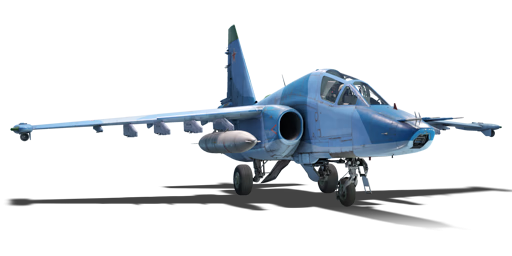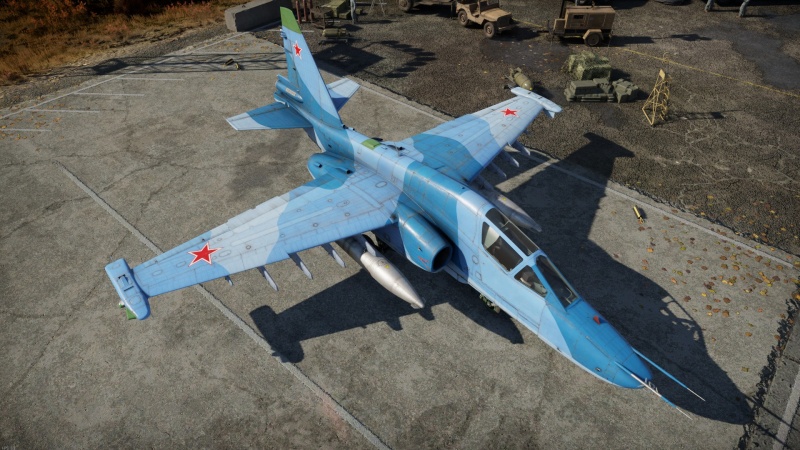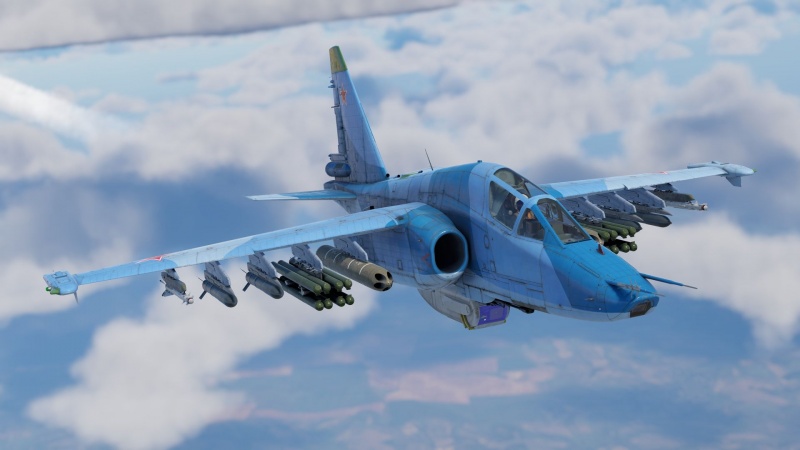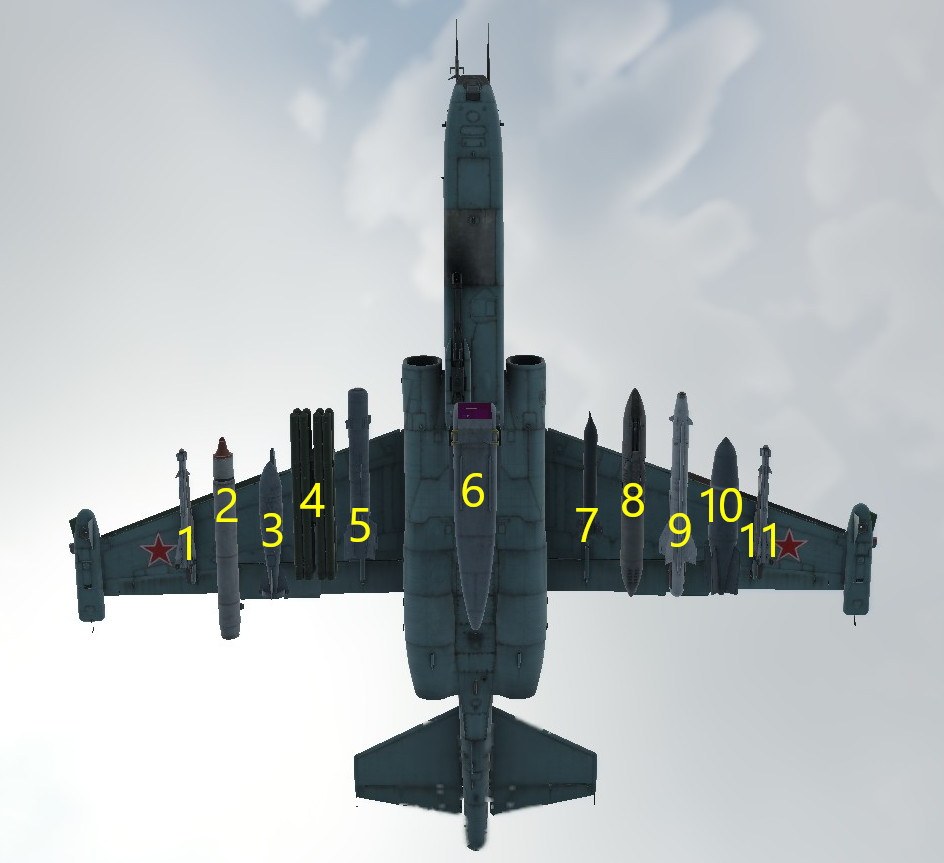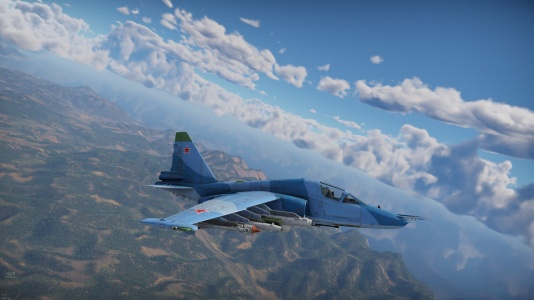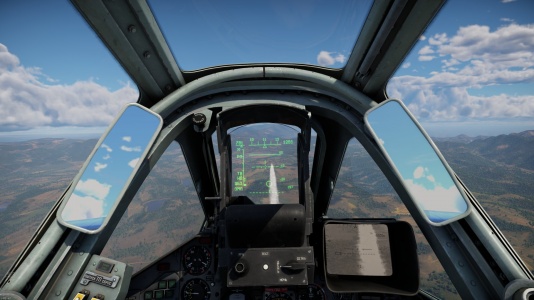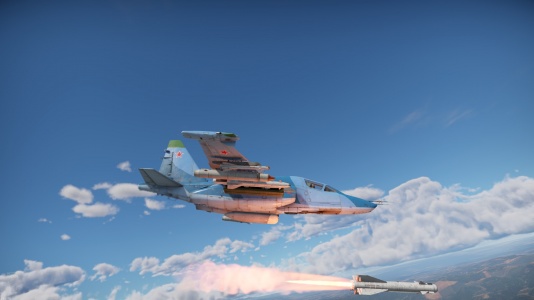Su-39
Contents
Description
A remarkable iteration of the Su-25 family, the Su-25TM (designated the Su-39 for export purposes) emerged as a product of Sukhoi's relentless pursuit of excellence in ground-attack aircraft design. Debuting in the late 1990s, this formidable aircraft marked a significant advancement over its predecessor, the Su-25. Its evolution was spurred by the lessons learned from conflicts such as the Soviet-Afghan War and the First Chechen War, where the Su-25 played a crucial role. The Su-39's capabilities were a testament to its modernization. Its arsenal featured an impressive array of weaponry, including precision-guided missiles like the Kh-29, Kh-25, and Vikhr, which enabled surgical strikes against both ground and naval targets. The integration of advanced avionics and targeting systems significantly enhanced its accuracy and situational awareness, allowing pilots to operate effectively in complex and dynamic environments.
The Su-39 was introduced in Update "La Royale". It stands as an epitome of ground strike prowess, a formidable aircraft purpose-built to excel in the art of precision attacks on terrestrial and naval targets. At its core lies a potent arsenal, highlighted by an array of guided air-to-ground missiles that define its battlefield dominance. Among these are the Kh-29, Kh-25, and Vikhr missiles, each embodying a unique blend of strategic versatility. The Kh-29, renowned for its extended range and pinpoint accuracy, enables the Su-39 to engage high-priority targets with surgical precision, making it a formidable choice for engaging fortified positions or high value targets. The Kh-25, on the other hand, offers rapid response capabilities, swiftly neutralizing time-sensitive threats with its agility and flexibility. Complementing these is the Vikhr missile, engineered to excel in anti-armour engagements, effectively dismantling armoured formations and bolstering ground forces. These air-to-ground missiles, seamlessly integrated into the Su-39's operational framework, transform it into a vanguard of modern warfare, bridging the gap between intelligence and action with lethal finesse.
General info
Flight performance
The Su-39's flight performance is nothing remarkable, particularly when it comes to combat scenarios where agility and responsiveness are paramount. Its design, characterized by sleek swept wings, ensures exceptional manoeuvrability, enabling precise and rapid in-flight adjustments. This agility is especially evident in its high-G manoeuvres, allowing the aircraft to execute evasive actions and engage targets with unparalleled precision even in dynamic and challenging environments. In combat, the Su-39's twin-engine configuration provides robust thrust, resulting in impressive acceleration and climb rates. This power-to-weight advantage not only facilitates swift engagement but also enables rapid altitude changes, a critical asset in maintaining the element of surprise and evading hostile threats. While the Su-39 excels in various aspects of ground attack and combat manoeuvrability, it's worth noting that it operates within a subsonic flight regime, resulting in a comparatively lower maximum speed. This subsonic characteristic, while not detracting from its overall combat effectiveness and versatility, does place certain limitations on its ability to rapidly cover vast distances.
| Characteristics | Max speed (km/h at 1,000 m) |
Max altitude (metres) |
Turn time (seconds) |
Rate of climb (metres/second) |
Take-off run (metres) | |||
|---|---|---|---|---|---|---|---|---|
| AB | RB | AB | RB | AB | RB | |||
| Stock | 968 | 962 | 11000 | 27.4 | 28.0 | 69.9 | 62.1 | 850 |
| Upgraded | 989 | 979 | 26.6 | 27.0 | 91.4 | 80.0 | ||
Details
| Features | |||||
|---|---|---|---|---|---|
| Combat flaps | Take-off flaps | Landing flaps | Air brakes | Arrestor gear | Drogue chute |
| ✓ | X | ✓ | ✓ | X | ✓ |
| Limits | ||||||
|---|---|---|---|---|---|---|
| Wings (km/h) | Gear (km/h) | Flaps (km/h) | Max Static G | |||
| Combat | Take-off | Landing | + | - | ||
| 1,100 | 420 | 1,050 | - | 420 | ~7 | ~3 |
| Optimal velocities (km/h) | |||
|---|---|---|---|
| Ailerons | Rudder | Elevators | Radiator |
| < 500 | < 600 | < 700 | - |
Engine performance
| Engine | Aircraft mass | ||||||
|---|---|---|---|---|---|---|---|
| Engine name | Number | Basic mass | Wing loading (full fuel) | ||||
| UMPO R-195 | 2 | 10,856 kg | 436 kg/m2 | ||||
| Engine characteristics | Mass with fuel (no weapons load) | Max Gross Weight | |||||
| Weight (each) | Type | 11m fuel | 20m fuel | 30m fuel | 37m fuel | ||
| 860 kg | Axial-flow turbojet | 12,008 kg | 12,927 kg | 13,963 kg | 14,696 kg | 19,573 kg | |
| Maximum engine thrust @ 0 m (RB/SB) | Thrust to weight ratio @ 0 m (104%) | ||||||
| Condition | 100% | 104% | 11m fuel | 20m fuel | 30m fuel | 37m fuel | MGW |
| Stationary | 3,741 kgf | 3,913 kgf | 0.65 | 0.61 | 0.56 | 0.53 | 0.40 |
| Optimal | 3,784 kgf (200 km/h) |
3,958 kgf (200 km/h) |
0.66 | 0.61 | 0.57 | 0.54 | 0.40 |
Survivability and armour
The Su-39's cockpit design prioritizes pilot survivability. By effectively attenuating and dispersing the damage, the anti-fragmentation armour significantly reduces the risk of damage to critical components, thus enhancing the aircraft's overall survivability. The aircraft's adept countermeasures system incorporates effective neutralization of threats by disrupting enemy radar and missile guidance systems. Notably, the inclusion of an Infrared Countermeasure (IRCM) system significantly enhances defense capabilities, emitting controlled infrared energy to deter and divert heat-seeking missiles. The Su-39 is able to withstand multiple hits from FIM-92K Stinger missiles and low-medium calibre munitions, solidifying its robust survivability profile while ensuring effective ground-strike mission execution and pilot safety.
Modifications and economy
Armaments
| Ballistic Computer | ||||
|---|---|---|---|---|
| CCIP (Guns) | CCIP (Rockets) | CCIP (Bombs) | CCRP (Bombs) | Lead indicator |
| |
|
|
|
|
Offensive armament
The Su-39 is armed with:
- 1 x 30 mm GSh-30-2 cannon, belly-mounted (200 rpg)
- 192 x countermeasures
Suspended armament
The Su-39 can be outfitted with the following ordnance:
| 1 | 2 | 3 | 4 | 5 | 6 | 7 | 8 | 9 | 10 | 11 | ||
|---|---|---|---|---|---|---|---|---|---|---|---|---|
| 23 mm GSh-23L cannons (250 rpg) | 1 | 1 | 1 | 1 | ||||||||
| 100 kg OFAB-100 bombs | 4 | 4 | 4 | 4 | 4 | 4 | 4 | 4 | ||||
| 250 kg OFAB-250Sh bombs | 1 | 1 | 1 | 1 | 1 | 1 | 1 | 1 | ||||
| 250 kg OFAB-250sv bombs | 1 | 1 | 1 | 1 | 1 | 1 | 1 | 1 | ||||
| 500 kg FAB-500M-62 bombs | 1 | 1 | 1 | 1 | 1 | 1 | 1 | 1 | ||||
| 500 kg FAB-500Sh bombs | 1 | 1 | 1 | 1 | 1 | 1 | 1 | 1 | ||||
| 500 kg KAB-500Kr bombs | 1 | 1 | ||||||||||
| ZB-500 incendiary bombs | 1 | 1 | 1 | 1 | 1 | 1 | 1 | 1 | ||||
| S-8KO rockets | 20 | 20 | 20 | 20 | 20 | 20 | 20 | 20 | ||||
| S-13OF rockets | 5 | 5 | 5 | 5 | 5 | 5 | 5 | 5 | ||||
| S-24B rockets | 1 | 1 | 1 | 1 | 1 | 1 | 1 | 1 | ||||
| S-25O rockets | 1 | 1 | 1 | 1 | 1 | 1 | 1 | 1 | ||||
| S-25OF rockets | 1 | 1 | 1 | 1 | 1 | 1 | 1 | 1 | ||||
| S-25OFM rockets | 1 | 1 | 1 | 1 | 1 | 1 | 1 | 1 | ||||
| S-25L missiles | 1 | 1 | 1 | 1 | ||||||||
| 9K127 Vikhr missiles | 8 | 8 | ||||||||||
| Kh-25 missiles | 1 | 1 | 1 | 1 | ||||||||
| Kh-25ML missiles | 1 | 1 | 1 | 1 | ||||||||
| Kh-29L missiles | 1 | 1 | ||||||||||
| Kh-29TE missiles | 1 | 1 | ||||||||||
| R-60M missiles | 1 | 1 | ||||||||||
| R-73 missiles | 1 | 1 | ||||||||||
| Kopyo-25 radar pod | 1 | |||||||||||
| Mercury targeting pod | 1 | |||||||||||
| 800 l drop tanks | 1 | 1 | ||||||||||
| Maximum permissible loadout weight: 4,400 kg Maximum permissible wing load: 2,200 kg Maximum permissible weight imbalance: 1,500 kg | ||||||||||||
| Default weapon presets | |
|---|---|
| |
Usage in battles
The Su-39's formidable arsenal of precision-guided weapon systems is explicitly tailored to unleash devastating target destruction capabilities across a diverse spectrum of ground attack scenarios. Take, for instance, the Kh-29 missile, a long-range precision instrument capable of obliterating entrenched enemies or flagships with surgical accuracy at an impressive range of 13 kilometres. Its potency is further magnified in engaging time-sensitive targets such as escort warships or mobile air defense systems, where the Kh-25 missile's rapid response capabilities ensure swift and effective destruction. In addition, the use of Mercury and Kopyo pods enhance the power projection capabilities and combat abilities of the aircraft. One of the primary capabilities of the Kopyo-25 radar pod is its ability to provide radar imaging and multi-target tracking via TWS mode. This allows the Su-39 to detect and track ground and air targets, even in adverse weather conditions or challenging terrain. The radar pod's imaging and tracking capabilities enable the aircraft to effectively identify and engage both stationary and moving targets, which are slaved to the FLIR, enhancing the pilot's situational awareness. The Kopyo-25 radar pod also plays a crucial role in target designation and guidance for precision-guided munitions. By accurately locating and designating targets, the radar pod enables the Su-39 to deliver highly accurate and effective strikes against a variety of targets effortlessly, including armoured vehicles, fortifications, and other high-value objectives. This enhances the aircraft's versatility and effectiveness in both offensive and defensive roles.
In the theatre of anti-armour warfare, the Vikhr missile system reigns supreme. Designed with precision engagement in mind, it strikes with unerring accuracy, systematically dismantling armoured formations and neutralizing the enemy's armoured might. Complementing these guided ordnance options is the Su-39's 30 mm GSh-30-2 cannon, a ground-pounding force that decimates ground targets ranging from enemy combat vehicles to fortified emplacements, leaving a trail of destruction in its wake. Expanding the Su-39's repertoire of devastation are additional munitions with their own specialized roles. Incendiary bombs, capable of igniting ferocious fires, can swiftly consume enemy bases or obstruct routes, adding a layer of tactical impact. Dumb rockets and bombs, with their widespread impact and formidable blast radius, excel in saturating large areas with destruction, obliterating enemy forces and fortifications in a single concerted sweep. Moreover, the Su-39's arsenal extends to high-drag bombs, designed to create concentrated impact points upon release. This capability proves invaluable in hitting entrenched or fortified targets with concentrated force, ensuring maximum structural damage. These high-drag bombs enable the Su-39 to deliver precise and punishing strikes against even the most resilient enemy positions with minimum exposure.
Pros and cons
Pros:
- Has IRCM on rear of the plane
- Wide variety of air-to-ground munition
- Decent acceleration
- Durable airframe
Cons:
- Poor manoeuvrability at low speeds
- Having the radar pod/mercury targeting pod affects manoeuvrability a lot
History
The Su-25TM, also known as the Su-39, is a highly capable and upgraded version of the original Soviet Su-25 "Frogfoot" close air support aircraft. The development of the Su-25TM began in the late 1990s with the aim of modernizing and enhancing the capabilities of the Su-25 platform. The aircraft underwent an extensive overhaul, incorporating advanced avionics, navigation systems, and weapon systems to improve its effectiveness on the modern battlefield.
The Su-25TM's history is marked by a series of technological advancements that transformed it into a formidable combat aircraft. Upgrades to its avionics included modern radar systems, improved navigation equipment, and enhanced communication systems, enabling the aircraft to operate more effectively in both air-to-air and air-to-ground missions. Additionally, the Su-25TM was equipped with modern precision-guided munitions and anti-tank missiles, significantly expanding its capabilities to engage a wide range of targets with greater accuracy and lethality.
Operational use of the Su-25TM began in the early 2000s, as the upgraded aircraft showcased its prowess in various conflicts and theatres around the world. It proved to be a versatile asset in counterinsurgency operations, close air support for ground forces, and interdiction missions. The aircraft's improved survivability, range, and versatility allowed it to excel in a variety of operational scenarios, earning the respect of both pilots and ground personnel.
Throughout its operational history, the Su-25TM demonstrated its effectiveness in conflicts such as counterterrorism operations, regional conflicts, and peacekeeping missions. Its ability to deliver precision strikes while enduring hostile environments and threats contributed to its reputation as a reliable and potent asset in modern warfare. The aircraft's success in combat validated the decision to upgrade and modernize the aging Su-25 platform, extending its service life and relevance on the battlefield.
Media
- Skins
- Images
- Videos
See also
Links to the articles on the War Thunder Wiki that you think will be useful for the reader, for example:
- reference to the series of the aircraft;
- links to approximate analogues of other nations and research trees.
External links
| Sukhoi Design Bureau (Сухого Опытное конструкторское бюро) | |
|---|---|
| Jet fighters | Su-9 · Su-11 |
| Su-27 | Su-27 · Su-27SM |
| Strike aircraft | |
| Su-2 | BB-1 · Su-2 (M-82) · Su-2 MV-5 · Su-2 TSS-1 |
| Su-6 | Su-6 · Su-6 (AM-42) · Su-6 (M-71F) |
| Su-7 | Su-7B · Su-7BKL · Su-7BMK |
| Su-8 | Su-8 |
| Su-17 | Su-17M2 · Su-17M4 · Su-22M3 |
| Su-25 | Su-25 · Su-25BM · Su-25K · Su-25T · Su-25SM3 · Su-39 |
| Export | ◊Su-22UM3K · ◔Su-22M3 · ◊Su-22M4 |
| J-11* | |
| *CKD and SKD kits assembled by Shenyang Aircraft Corporation | |
| USSR jet aircraft | |
|---|---|
| Bereznyak-Isayev | BI |
| Yakovlev | Yak-15 · Yak-15P · Yak-17 · Yak-23 · Yak-28B · Yak-30D · Yak-38 · Yak-38M · Yak-141 |
| Mikoyan-Gurevich | MiG-9 · MiG-9 (l) · MiG-15 · MiG-15bis · MiG-15bis ISH · MiG-17 · MiG-17AS · MiG-19PT |
| MiG-21F-13 · MiG-21PFM · MiG-21S (R-13-300) · MiG-21SMT · MiG-21bis | |
| MiG-23M · MiG-23ML · MiG-23MLD · MiG-27M · MiG-27K | |
| MiG-29 · MiG-29SMT | |
| Lavochkin | La-174 · La-15 · La-200 |
| Sukhoi | Su-9 · Su-11 |
| Su-7B · Su-7BKL · Su-7BMK · Su-17M2 · Su-17M4 · Su-22M3 | |
| Su-25 · Su-25BM · Su-25K · Su-25T · Su-25SM3 · Su-39 | |
| Su-27 · Su-27SM | |
| Ilyushin | IL-28 · IL-28Sh |
| Tupolev | Tu-14T |
| USSR premium aircraft | |
|---|---|
| Fighters | Krasnolutsky's I-15bis · I-16 type 28 · Zhukovsky's I-153-M62 · I-153P · I-180S · I-301 · ITP (M-1) |
| LaGG-3-4 · LaGG-3-23 · LaGG-3-34 · Dolgushin's La-7 · La-11 | |
| Eremin's Yak-3(e) · Yak-3 (VK-107) · Yak-3T · Golovachev's Yak-9M | |
| ▂P-39K-1 · ▂Pokryshkin's P-39N-0 · ▂P-39Q-15 · ▂P-40E-1 · ▂P-47D-27 · ▂P-63A-5 · ▂P-63A-10 · ▂P-63C-5 | |
| ▂Hurricane Mk IIB · ▂Spitfire Mk IXc · ▂Fw 190 D-9 | |
| Twin-engine fighters | I-29 |
| Jet fighters | Su-11 · MiG-15bis ISH · MiG-17AS · MiG-21S (R-13-300) · MiG-23ML |
| Strike aircraft | IL-2M "Avenger" · IL-2 M-82 · IL-8 (1944) · Su-6 · Tandem MAI · TIS MA · Su-8 · Tu-1 |
| Yak-38 · Su-7BMK · Su-25K · Su-39 | |
| Bombers | Po-2M · Be-6 · MBR-2-M-34 · Pe-2-205 · TB-3M-17-32 |
| ▂PBY-5A Catalina · ▂Hampden TB Mk I · ▂A-20G-30 · ▂B-25J-30 | |


